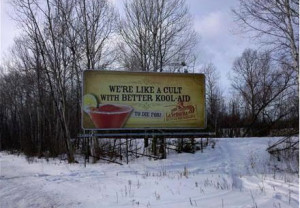“We’re like a cult with better Kool-Aid,” boasted a recent billboard featuring a mixed drink that was “To die for!” But the signs didn’t last long – when complaints began rolling in, the Indiana chain of Mexican eateries responsible for the ad campaign quickly pulled them down.
I’m too young to remember the Jonestown massacre, but I’m quite familiar with the phrase “don’t drink the Kool-Aid.” This adage, inspired by the horrific events in the Guyana jungle over 30 years ago, has become cultural shorthand for identifying a blind stumble into a crazy agenda.
Due to the prevalence of this expression, Hacienda, the restaurant with the “to die for” drinks, was surprised at the negative reaction to their ads. Jeff Leslie, vice president of sales and marketing at Hacienda, told the South Bend Tribune: “Our role is not to be controversial or even edgy. We want to be noticed – and there’s a difference.”
So what’s different about Jonestown? Why can’t I imagine the memory of any other tragedy being so casually exploited to sell a margarita? Why does this incident – said to be the largest loss of American civilian life outside of natural disasters until 9/11 – receive so little respect?
In his 2007 essay Myth of the ‘Zombie Kool-Aid Death Cult’, journalist Matthew Newton claims that, before researching the incident for his article, he had simply classified the events at Jonestown as just another example of “crazy religious cults bent on self-destruction.” He blames this simplified portrayal on the myths and clichés the media encouraged in their coverage of the incident – a caricature of mindless drones lured by a charismatic figure. “
Every time I hear the phrase ‘drink the Kool-Aid,’ it’s like pouring salt into the wound,” said Jonestown survivor Tim Carter during an interview with Newton. “It is a sports cliché now. I really think if people had any comprehension of what happened in Jonestown, they would no more use that phrase lightly than they would some phrase that emerged from the Holocaust. There was just too much tragedy and too much pain to make it a cliché.”
In his own article 30 Years Later, Carter offers further insight into why Jonestown no longer registers as significant to public perception. “In 1980 the Associated Press voted Jonestown tragedy as one of the ten biggest stories of the century. In the year 2000, Jonestown didn’t make a single list of top one hundred stories for the century,” he writes. “So what if nine hundred plus ‘whacko cultists’ committed ‘suicide?’”
The public dismissal of Jonestown is unfortunate because its narrow portrayal as a mass suicide is misleading. Not only because a great number were actually murdered (as many as 700 according to the testimony of a Guyanese coroner), but also due to the organization’s history of administering psychotropics and sedatives.
Consider accounts from surviving members of the Peoples Temple revealing that many had endured months or even years of drug-enhanced mind control. Perceived troublemakers or people wishing to escape the compound were reportedly given heavy tranquilizers to keep them in line. Other drugs were used for brainwashing. Some investigators suggest that many cult members were drugged so they would properly perform the Kool-Aid ritual.
Dr. Joyce Lowinson, a psychiatrist and member of President Carter’s Council on Drug Abuse Prevention, told the San Francisco Examiner in 1978 that the quantity and quality of drugs found at Jonestown revealed that there were either “a lot of psychotic patients, or they were using them to control people.”
The more I learn about Jonestown, the weaker the standard depiction becomes. This wasn’t merely a group of misguided zealots dutifully following orders to take their own lives. Subjected to a regular regimen of strong pharmaceuticals, manipulative mind control techniques, and brutal beatings, these individuals had, in some ways, lost their lives long before they took that last sip.
There is said to have been a sign hanging above the tub containing the notorious purple cocktail that read “Those who do not remember the past are condemned to repeat it.” It’s a shame the people of Jonestown don’t receive the sympathy normally afforded to souls of great tragedies. The least we can do is avoid using their memory for a sales pitch.
(Conan Milner is a staff writer for may be reached at The Epoch Times, in which this article originally appeared. It republished with permission. He may be reached at conan.milner@epochtimes.com.)
